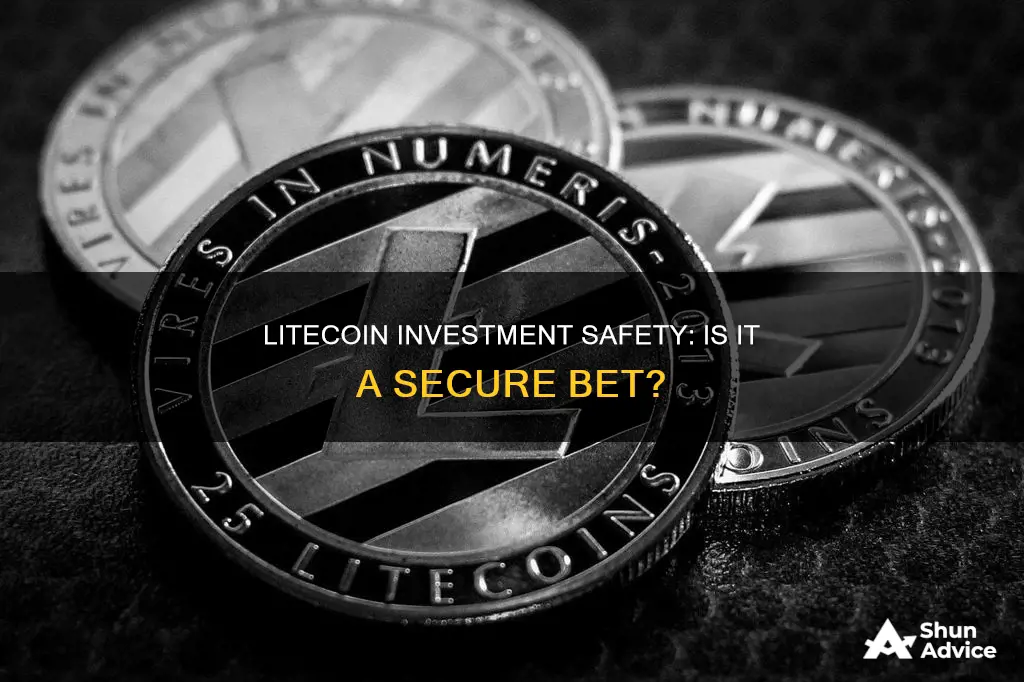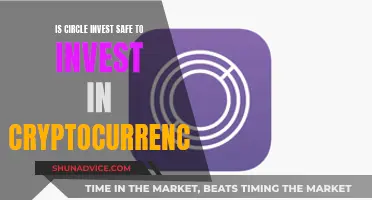
Litecoin is a cryptocurrency that was created in 2011 by former Google employee Charlie Lee. It is one of the oldest cryptocurrencies on the market and is currently the 14th largest by market capitalization, with a total value of more than $5 billion. Litecoin is often referred to as digital silver, with Bitcoin being digital gold. It is designed to be a faster and more affordable alternative to Bitcoin, with transactions taking just 2.5 minutes compared to Bitcoin's 10 minutes.
Litecoin has had a volatile price history, with dramatic fluctuations over the years. It has also been through a period of poor sentiment, like the rest of the cryptocurrency market. However, it has shown itself to be a survivor, always recovering from plunges.
There are several benefits to investing in Litecoin. It is faster and has lower transaction costs than Bitcoin. It also has a big market capitalization and is highly liquid, making it immune to sudden drops and protecting it from manipulation. Additionally, it has a strong team of developers and is accepted by a variety of companies.
However, there are also risks associated with investing in Litecoin. The cryptocurrency market is extremely volatile, and Litecoin has had explosive returns in the past. Its founder, Charlie Lee, has also sold a massive amount of his holdings, tarnishing investor confidence.
Overall, whether it is safe to invest in Litecoin depends on your risk tolerance and investment goals. It may be a good option for those looking to get into the cryptocurrency market without spending a lot of money, as it is relatively affordable compared to Bitcoin. However, it is important to remember that cryptocurrencies are volatile and relatively untested investments, and there is a lot of uncertainty around the industry.
| Characteristics | Values |
|---|---|
| Price | $72 as of 2024 |
| Market Capitalization | $5 billion as of 2024 |
| Transaction Speed | 2.5 minutes |
| Transaction Cost | $0.40 |
| Founder | Charlie Lee |
| Current Standing | 14th largest coin by market capitalization |
| Safety | Not safe due to high volatility |
What You'll Learn

Litecoin's transaction speed
The faster transaction speed of Litecoin has made it more popular over time. Litecoin is capable of processing 56 transactions per second, compared to approximately 7 transactions per second for Bitcoin. This makes Litecoin a faster and more efficient cryptocurrency for making payments and transactions.
The combination of fast transaction speed and low fees has made Litecoin a popular choice for crypto investors and merchants. Litecoin is consistently ranked as the second most popular cryptocurrency used for making payments, thanks to its fast confirmation times and low fees.
Strategies for Choosing the Right Crypto Coin
You may want to see also

The future of Litecoin
Litecoin is one of the oldest cryptocurrencies in the market, and it has consistently ranked in the top 15 cryptocurrencies by market cap, making it relatively stable compared to other altcoins.
Litecoin is often referred to as digital silver, with Bitcoin being digital gold. Litecoin has many similar attributes to Bitcoin and is considered the first successful alternative cryptocurrency or altcoin.
Litecoin has a fixed supply of 84 million LTC, four times the supply of Bitcoin, and a much shorter block generation time of 2.5 minutes, making it a faster and cheaper solution for sending and receiving money.
Coinpedia predicts a slow and steady growth for Litecoin, reaching $500 by 2030. Crypto Bulls Club and Cryptonewsz also have positive Litecoin forecasts, with the former suggesting a gradual rally and the latter expecting LTC to trade at around $200 by 2030.
On the other hand, some experts are less bullish on Litecoin. For instance, Tyrone Ross Jr., CEO of Onramp Invest, believes that Litecoin is not a good investment due to a lack of robust developers and engineers, and the creator of Litecoin selling most of his coins.
The price of Litecoin has been highly volatile, and it is difficult to predict its future value with certainty. However, with its strong fundamentals, growing community, and increasing adoption, Litecoin is expected to continue attracting investors and traders.
In conclusion, the future of Litecoin depends on several factors, including the overall crypto market sentiment, Bitcoin's performance, regulatory clarity, and increased adoption by merchants and consumers. While there are risks and challenges, Litecoin has the potential to grow and become more widely used in the coming years.
The Ultimate Guide to Investing in Dogecoin via Cash App
You may want to see also

Litecoin's market capitalisation
Litecoin (LTC) is a cryptocurrency that was designed to provide fast, secure and low-cost payments by leveraging blockchain technology. It was created by Charlie Lee, a former Google employee, and released on 7 October 2011. The Litecoin network went live five days later on 13 October 2011.
Litecoin is often referred to as "digital silver" in comparison to Bitcoin's reputation as "digital gold". It is one of the oldest cryptocurrencies and is currently ranked 14th in terms of market capitalisation, with a total value of more than $12.3 billion.
As of January 2021, Litecoin is one of the most widely accepted cryptocurrencies, with over 2,000 merchants and stores accepting LTC across the globe. Its main benefit comes from its speed and cost-effectiveness. Litecoin transactions are typically confirmed in just minutes, and transaction fees are extremely low.
The current market cap of Litecoin is $4.87 billion. The all-time high of Litecoin is $420, which is the highest price paid for the cryptocurrency since its launch. The circulating supply of Litecoin is 75 million, with a maximum supply of 84 million LTC.
Coinbase Crypto Investment: Best Bets for Your Buck
You may want to see also

The risks of investing in Litecoin
Like any other cryptocurrency, investing in Litecoin comes with risks. Here are some key points to consider:
Volatility and Market Risk
The cryptocurrency market is highly volatile, and Litecoin is no exception. The value of Litecoin has experienced wild swings, with rapid spikes followed by steep sell-offs. This volatility can lead to significant losses if you invest a large amount or at the wrong time. It is crucial to be cautious and consider your investing strategy carefully.
Founder's Reduced Stake
Litecoin's founder, Charlie Lee, sold all his holdings in Litecoin, citing a conflict of interest. This move may have shaken investor confidence and raised questions about the coin's future prospects.
Competition from Other Cryptocurrencies
Litecoin faces competition from other cryptocurrencies, including Bitcoin and various altcoins. Some competing coins offer lower prices and faster transaction speeds, which could potentially reduce Litecoin's market share and impact its value.
Sentiment and Adoption
The sentiment around Litecoin and the broader cryptocurrency market has been poor recently. This can influence investor confidence and impact the price. Additionally, while Litecoin has a strong community and is widely used, there may be concerns about its adoption on a larger scale, which could affect its value.
Halving Event Impact
Litecoin's halving event, where the reward for mining blocks decreases over time, does not seem to have the same positive impact on its value as similar events have had on Bitcoin. This could be a factor to consider when evaluating the potential for price increases.
Regulatory and Security Risks
As with any cryptocurrency, there are regulatory risks associated with investing in Litecoin. The regulatory landscape for cryptocurrencies is evolving, and changes in policies or restrictions could impact the value of your investment. Additionally, there is always the risk of security breaches or hacks, which could result in the loss of your investment.
A Beginner's Guide to Investing via Coinbase
You may want to see also

How to invest in Litecoin
If you're looking to invest in Litecoin, there are several ways to do so. Litecoin (LTC) is a cryptocurrency that was created in 2011 by developer Charlie Lee. It is one of the oldest and most popular cryptocurrencies on the market, often referred to as the "silver to bitcoin's gold".
Understand Litecoin and the Risks Involved:
Before investing in any cryptocurrency, it is essential to do your research and understand the technology behind it. Litecoin is intended to be a decentralized, peer-to-peer payment system. It has faster transaction confirmation times compared to Bitcoin and lower transaction fees. However, it has also experienced wild swings in value, and its creator Charlie Lee has sold a large portion of his coins, which may impact investors' confidence.
Choose an Exchange or Platform:
You can purchase Litecoin through various exchanges or platforms, such as Coinbase, Kraken, Coinmama, Binance, or Gemini. These platforms offer different features, fees, and security measures, so be sure to compare them before selecting one that suits your needs.
Set Up an Account:
To buy Litecoin, you will need to create an account on your chosen exchange or platform. This typically involves providing personal information, such as your name, email address, and verifying your identity with a valid ID. Some platforms may also require proof of address.
Add a Payment Method:
Once your account is set up, you will need to connect a payment method. Common options include using a bank account, debit card, credit card, or initiating a wire transfer. Be aware that not all platforms accept all payment methods, so check beforehand to ensure your preferred method is supported.
Make Your Purchase:
After your payment method is connected, you can start purchasing Litecoin. Specify the amount you want to spend, and the platform will convert it into the equivalent amount of Litecoin. Review the details of your purchase, including any fees, before finalizing the transaction.
Secure Your Litecoin in a Wallet:
Once you've purchased Litecoin, consider transferring it to a secure wallet. There are different types of wallets, such as mobile, web-based, or hardware wallets, each with its own advantages for frequent transactions or long-term storage. Keeping your Litecoin in a wallet gives you more control over your crypto assets and enhances security.
Monitor the Market and Consider Different Investment Strategies:
Litecoin and the crypto market, in general, are highly volatile. Keep yourself updated on market trends and consider different investment strategies, such as buying and holding, spot trading, or derivatives trading, to make informed decisions. Remember that investing in cryptocurrencies carries significant risks, so only invest what you can afford to lose.
By following these steps, you can start investing in Litecoin, but always remember to do your due diligence, understand the risks, and make informed decisions based on your financial situation and risk tolerance.
The Crypto Investment Conundrum: Which Coin to Choose?
You may want to see also
Frequently asked questions
Litecoin is a volatile asset, and as with any cryptocurrency, there are risks involved. However, it has been around since 2011, making it one of the oldest and most established cryptocurrencies. It has a strong track record and has weathered major storms in the crypto market, giving it a level of stability that many other coins lack.
The cryptocurrency market is highly volatile, and Litecoin is no exception. The value of Litecoin has fluctuated dramatically, and it has seen wild swings during its lifespan. There is also competition from other cryptocurrencies that offer similar or enhanced benefits, such as faster transaction speeds and lower prices. Additionally, there has been shaky faith in leadership as the founder, Charlie Lee, sold his stake in the project, citing a conflict of interest.
Litecoin has several advantages, including faster transaction speeds and lower fees compared to Bitcoin. It is also highly liquid, making it easy to buy and sell. Litecoin has a strong team of developers and is continuously innovating, which is essential for the long-term success of any cryptocurrency. It also has a large market capitalization, providing stability and protection against manipulation.







